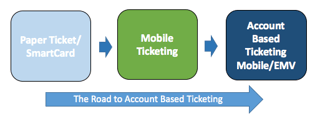As a ticketing provider we often get asked to share our thoughts on the future of transport ticketing and how transport providers (authorities and operators) can start the journey towards Account Based Ticketing.
Account Based Ticketing is defined by the Smartcard Alliance as “The transit fare collection system architecture that uses the back office system to apply relevant business rules, determine the fare, and settle the transaction.” - what this means for the passenger is they are able to use whatever they have in their pocket to travel, as the fare logic moves from the card to the cloud.
In this blog we focus on the how we see the future of transport ticketing and the best way transport providers can start out along the evolutionary path to account based systems.
The Future of Transport Ticketing
First of all, let's briefly discuss the future of transport ticketing. We believe that the future of ticketing revolves around Account Based systems, where each passenger has their own 'account' which is stored in the back office.
By managing passenger's travel rights through their account, the ticket logic is moved away from the physical ticket and into a central back office location.
This has multiple benefits for the transport provider. Fare changes become much more straightforward, as readers don’t need to be individually updated, saving costs. Customer service is improved as the ticket resides in the cloud - not on the card, and reporting can be delivered in real-time. It allows 'tokens' to act as tickets, meaning that as long as the token is secure and has the necessary technology to scan into the network (be it Barcode, RFID, NFC, EMV, BLE) then passengers can use what they have in their pocket to travel.
The Journey to Account Based Ticketing
The transport providers that have moved to Account Based Ticketing have taken the following path:

Paper tickets have traditionally been replaced by Smartcard systems. These systems brought the advantages of better information for the transport provider and also did a great job in helping reduce leakage as well as being robust and reliable.
However, introducing a Smartcard system meant that providers were installing a closed loop system where ticket information was stored in the card and tickets had to be provided by the transport provider.
These systems are extremely expensive to install and maintain, as well taking years to roll out. Most providers who have taken this route are currently operating a mixture of all three systems as they slowly look to move passengers away from paper then Smartcard tickets.
The pace of change in the ticketing industry means that this route is no longer necessary. In fact, in a lot of cases, does not make sense for the transport provider.

Mobile ticketing is changing how transport providers can move their organisation towards Account Based Ticketing. Taking our JustRide platform at an example: Fare logic resides in the back office, so you can get all the advantages of a Smartcard system with the added benefits of an account based central back office. At the same time, mobile ticketing eases the pressure on existing ticketing infrastructure by moving people away from ticket vending machines and sales offices.
In an open system mobile ticketing can be rolled-out without any capital expenditure, being quick to install (weeks and months rather than years), so transit providers can have an account based system immediately. In a closed system, readers can be upgraded without being replaced, by retrofitting multi-mode readers, allowing for mobile barcode reading today, but also the option to add EMV and BLE compatibility for future upgrades – providing a much more modular approach to upgrades.
The key requirement is to make sure that the architecture behind readers and mobile ticketing is ready for Account Based Ticketing, and can demonstrate that it has been built ready to be extended to Account Based Ticketing, rather than requiring replacement. Then business processes can even start to evaluate Account Based Ticketing using barcode tokens, ready for extending to other token types.
The final hurdle preventing Account Based Tickets replacing all tickets straight away is that for last minute purchase+travel, the only account based token that works without being vulnerable to comms failure is a fully credit worthy payment card.
Unfortunately if your account, or payment card has run out of funds, and you top it up, it can take time for the top-up to be communicated to all buses or stations to allow you to travel.
It is because of communication delay issues that TfL are keeping the Oyster card in service to allow last minute top-up and instant travel. Because of this we recommend that providers start moving towards Account Based Travel starting with longer term passes and accounts that need less instant gratification, and keeping last minute tickets on more traditional barcode or other encoded media that can be instantly used straight after purchase. Once communication gets more reliable Account Based Ticketing can move to those ticket types too.
Conclusion
Whether operating a smartcard or paper ticketing system, installing mobile ticketing allows for a quick deployment of an Account Based Ticketing solution. This gives providers infinite sales capacity and starts to move passengers away from expensive traditional ticketing options.
By installing a solution run from a central back office and choosing a supplier with the correct future proof architecture, providers can start to move along the road to full Account Based Ticketing. Once mobile ticketing is operational, providers can gradually integrate other ticketing tokens into the central back office. The ultimate goal being full Account Based Ticketing and allowing passengers to use what they have in their pocket to travel, be it a mobile phone, or contactless card etc.
If you would like to see a demonstration of Account Based Ticketing aware architecture in action, leveraging a standard mobile ticketing roll out - please contact Masabi and ask for a demonstration.


